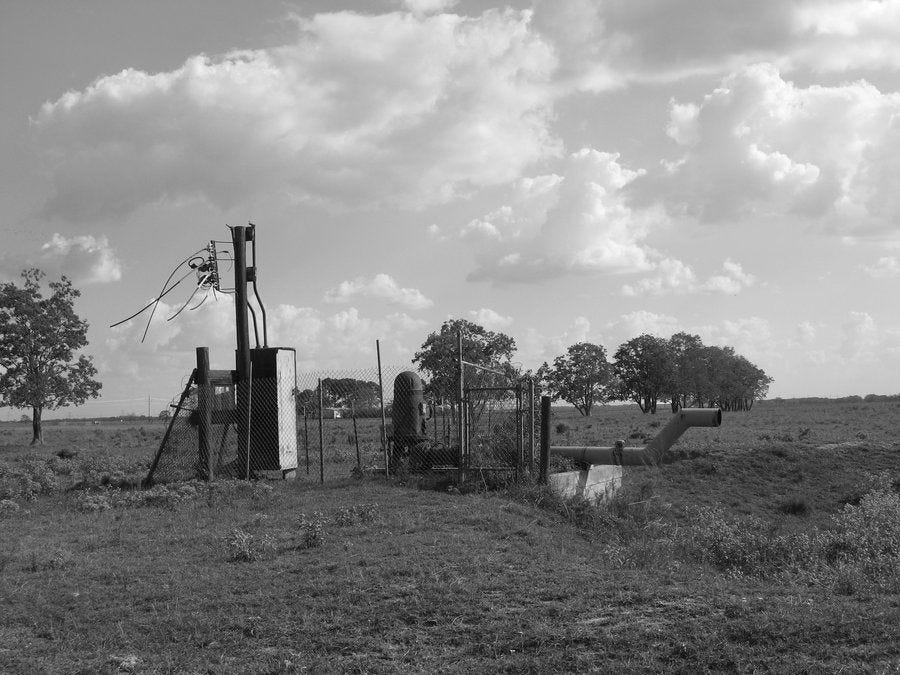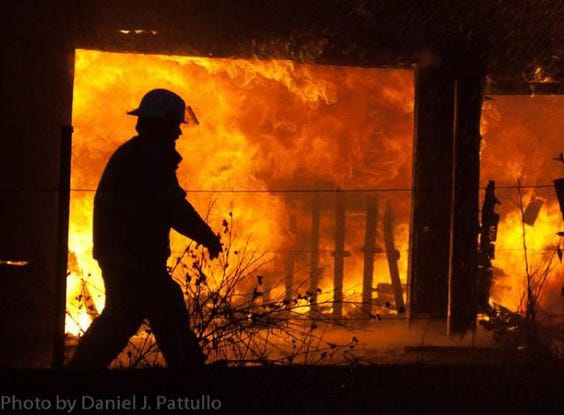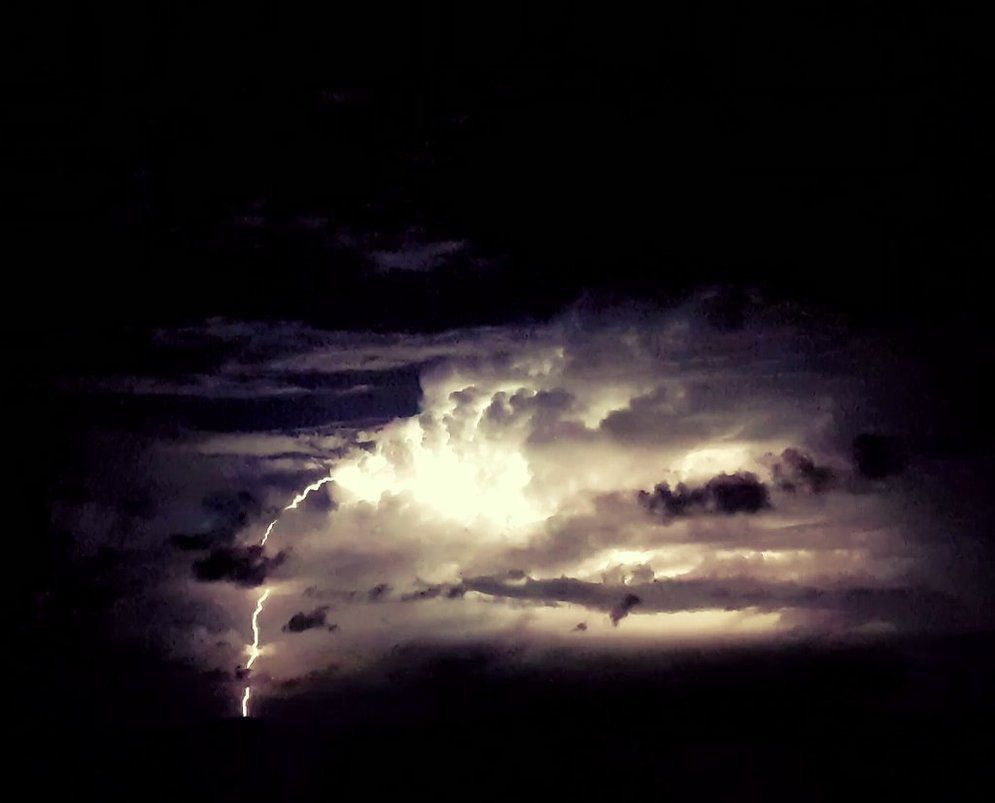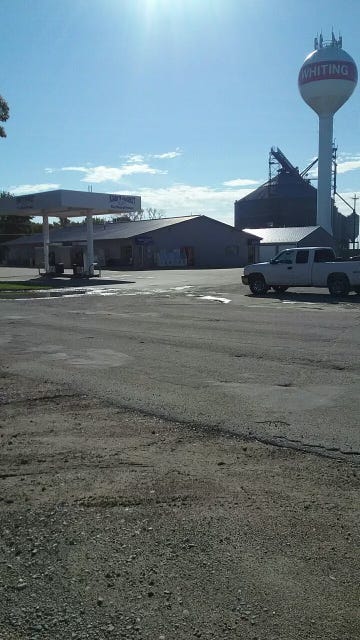The fire began inside the old bin. It burned from the inside out to keep it under control. Very quickly the entire structure was in flames but with a certain order—if anything can ever burn in an order—that made the walls fall in on themselves. The old buildings nearby were never in danger.
The State Fire Marshall told me, while I stood by the blaze, burning full force, that the objectives for the burn were:
1. Remove old bin from premises by supervised, controlled fire.
2. Train rural firemen from the surrounding towns: Sloan, Hornick, Mapleton, Onawa, Blencoe, Salix. Strangers in my town with familiar faces, for these towns are so close men see each other on the road in passing pick-ups, faces framed by windshields, men who come when you need them—not like my face to Isaac, who has tried to manage me and who wouldn’t help me when I needed him though ironically I now see that he did help me. This is not to say that a man might not help someone in order to manage him, but it is to say that a stranger who comes when he’s needed thinks about the world in a simpler way.
3. Control the fire without using city water. Fire trucks were filled from local irrigation wells. These wells, another form of control.
I asked why do it this way? “Conservation,” he said. “We use the untreated water that feeds the corn, not the town wells that fill the taps, though there’s plenty there too. The firemen, farmers themselves, not professional fire fighters, need to learn, pump out in the fields, prepare.” The men were preparing for the unexpected.
I had not prepared.
The firemen were so certain of their ability to control the fire that they allowed onlookers to stand, in my opinion, way too close—though I am forever glad to have been there with the heat in my face. The heat of this fire made me understand the power of lightning because the fire burned into me, into every part of me. Later, the ashes smoked and heated the air long past nightfall.
Though Lena couldn’t have imagined this fire, she would have understood it.
Because she was resigned and shamed that night she danced in front of me, she went to bed and slept apart from me in our bed. The space between us in the bed was a conflagration that neither of us could safely enter. That space was an uncontrolled fire like the fire between the lovers, Isaac and Lena. You might say, No, the lovers are different; they make love; they are in love. But I say, No matter. It is safety that is key to my analogy. One can create a conflagration in marriage or in betrayal of it. This I see now—how I created an unsafe space for the woman I loved and its similarity to a conflagration.
The controlled fire that burned the bin in my home town makes my analogy clear. No one needed to be pulled from that fire. All were safe from it though in itself it was a burning danger. This is the difference between a controlled fire and a conflagration.
This is of interest to me and my penchant for the analytical, but it is hardly newsworthy as all of us who watch television or read the papers know.
Thus, the controlled burn didn’t make the news the way the breaking of the corn bin did three years before—a split in the metal silo, a flaw that gave way under the pressure of the stored corn and then an avalanche that descended on the workers repairing the bin, corn sliding in waves toward the railroad tracks, toward Kirby’s, the nearby grocery store.
It’s disaster that makes news—or the near disaster.
The corn-bin break, being of the near-sort, got a spot on the nationwide evening news because a camera-ready helicopter was hovering for routine farm news of the repair and got film of the deluge, or what appeared to be disaster-in-progress.
It was a miracle of sorts that no one was buried under the mass of seed corn—just one truck with no one in it.
I’ve wondered what else was lost in that deluge of corn: small things that lie on the ground—like that sheet-rock screw Isaac had found on the street and placed in his pocket, an evocative discovery, seemingly inconsequential until he explained it. But she’d confused its use. He wouldn’t need a sheet-rock screw for her imaginary wooden gazebo. He’d need it for the greenhouse he’d build for Evan.
You may observe that I, her husband, am an ordinary cuckold, mocked by their longing, that I’m angry, want revenge and so I write to expose them. But you would be wrong.
I have become, instead of angry, full of self-loathing. The idea of just or unjust desserts, either conclusion, now comes too easy. Her death has made former conclusions mere notions.
Lena’s mother loved the “Notions Department” at the May Company, where she worked when she was a young woman and where she went when she was a housewife and a seamstress. She bought her thread there, the seam ripper that she treasured with its curved, sharp end for pulling out thread tightly sewn and that she used for the seam in need of letting out or taking in, in need of an adjustment.
These small necessities, the notions, are part and parcel of making the garment we call life.
I’ve begun with a notion: the fire I saw in Iowa because it was a direct hit for me.
I stood with my father in the center of town in Whiting, Iowa, after the burn in the heat of the fire, recalled the flame I put out with my fingers when I was a child, stood with him in the cool of the summer night under a sky after fire.
I think of Lena this way: sky after fire.
If you’d asked me to name the color of the fire when I began, I would have said, “Red” because I liked to think of myself as a simple man, prided myself on my lack of spontaneity. Now I think of the blue inside or even of some other color: green fire, black fire, white fire.△













The visuals and the video remind me of Chris Marker's notion of the "super cobbler" but then... they're all held together by such incredible language: "One can create a conflagration in marriage or in betrayal of it. This I see now—how I created an unsafe space for the woman I loved and its similarity to a conflagration." Love.
What I love about your writing Mary is your attention to detail and getting to the essentials of what matters to the characters and what the reader should know, avoiding the "over-supply." One of the best pieces of advice you ever gave me as a teacher and reader is "cut it." It stays with me every time when I write flash fiction.
What I like about you adding parts of the story here on substack are the visuals and video. Well done.